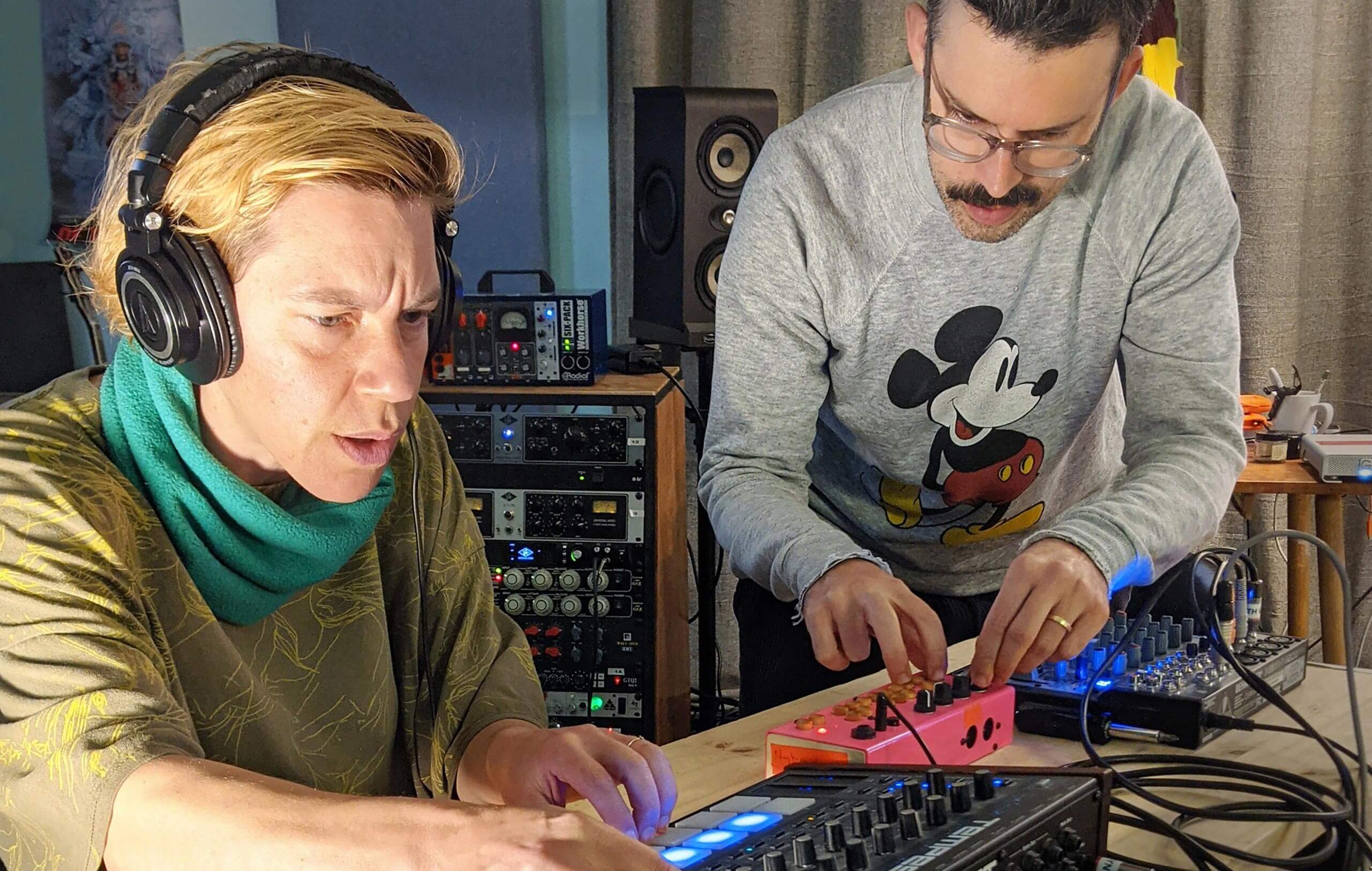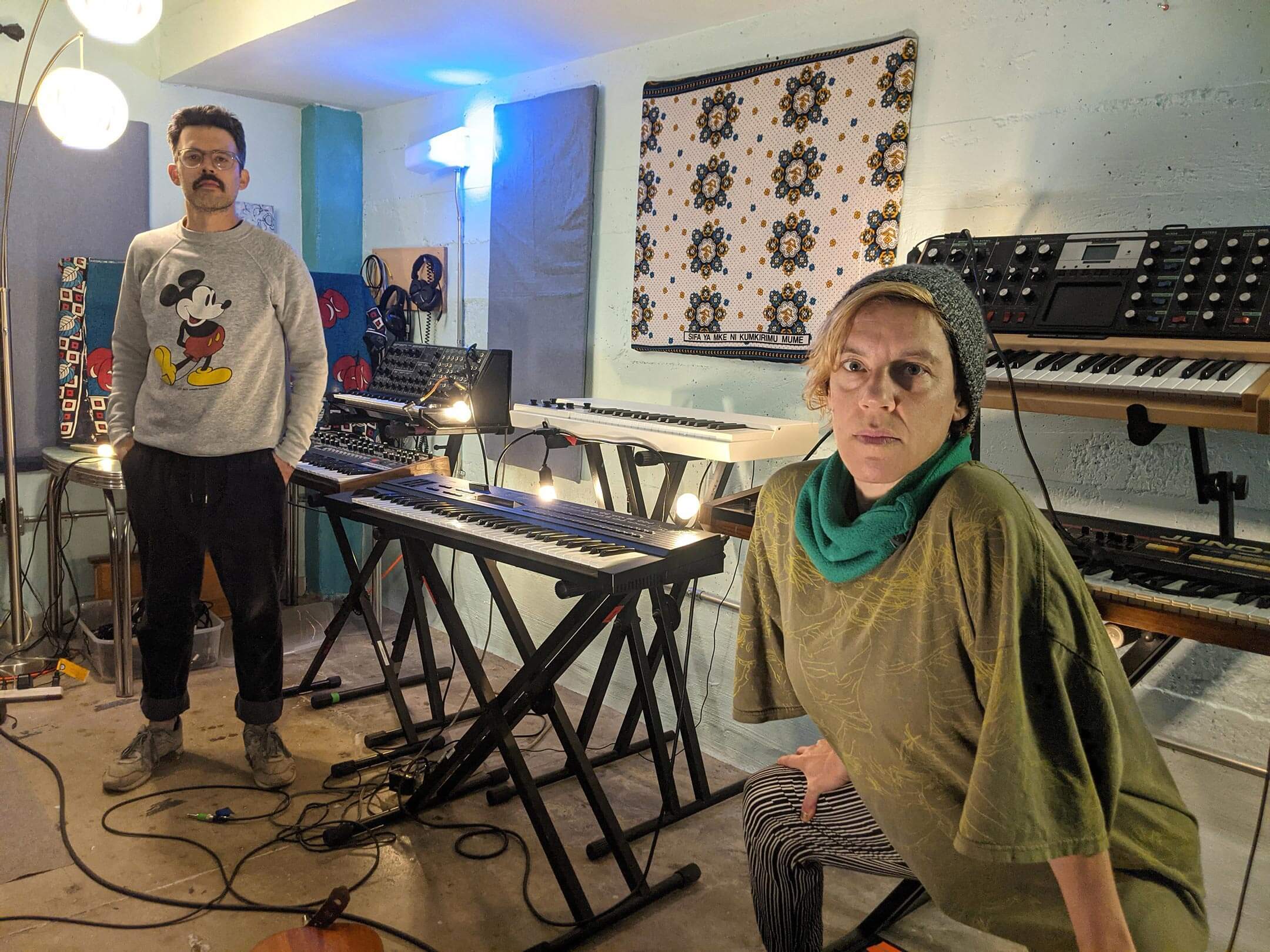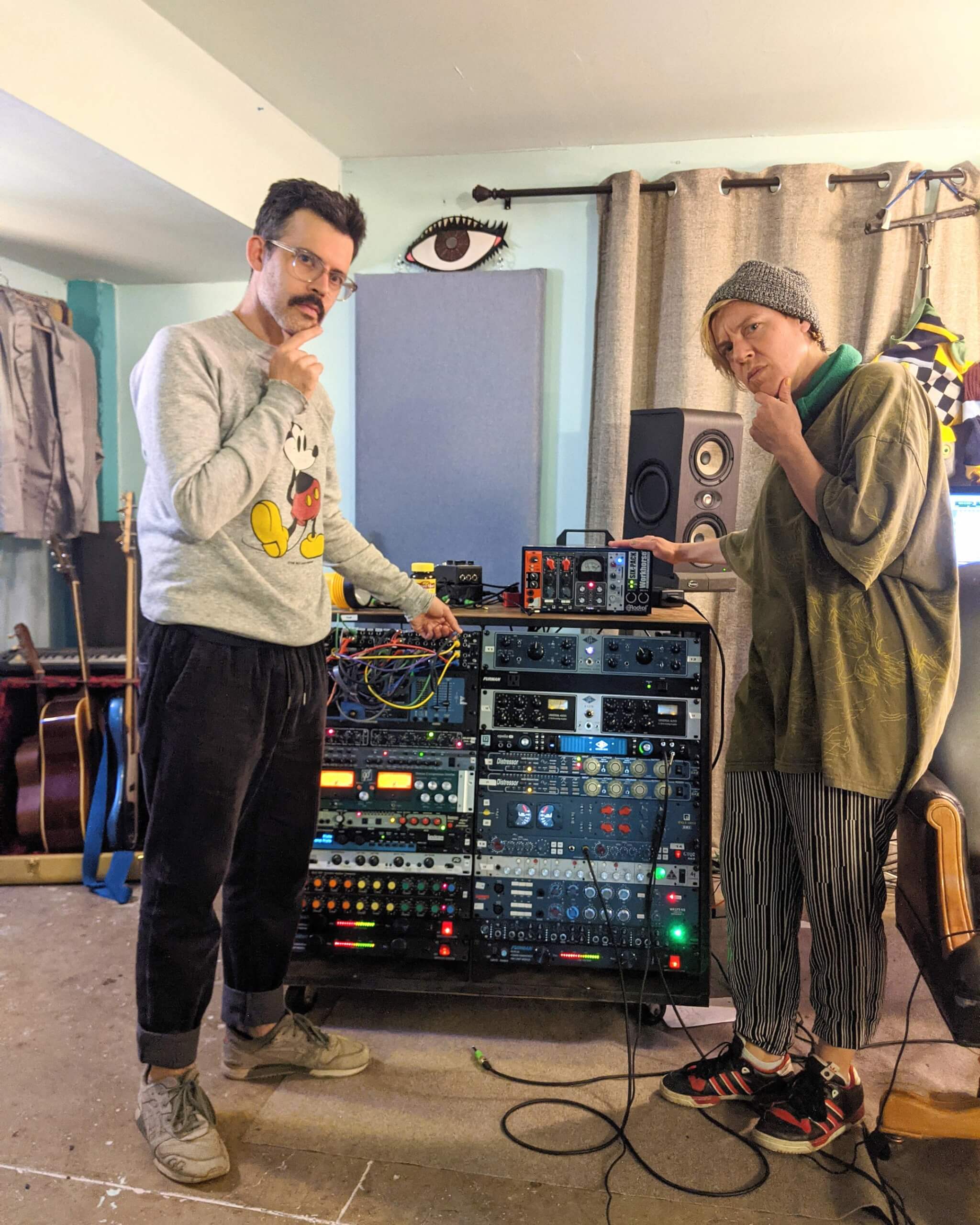Tune-Yards on sketchy, studio discipline and wanting to change the world
Eclectic experimentalists Tune-Yards talk us through their new record, sketchy, and that they want to heal not harm with their music.

“Do as much as you can to get to the sound you want before you put that power into someone else’s hands,” advises Merrill Garbus, one of the creative forces behind the freewheeling US indie-pop of Tune-Yards.
She’s tracing the roots of her unique band, an exuberant, psychedelic outfit currently revving the engines around the release of their fifth album, sketchy. This latest collection, made with long-term musical partner Nate Brennan, comes after a period of self-reflection on a successful but sometimes bumpy journey.
“At the start, I had some really bad studio experiences where I felt like I wasn’t listened to by engineers,” Merrill remembers. “I had a sound in my head – but was told it wasn’t right.”
Her story underlines the importance of artists speaking their creative truth to those in positions of power and how traditional authority figures need to be questioned and pushed. Merrill’s musical story is an interesting one, born out of her work as a puppeteer and a love for musical theatre and African music. These influences collide over dishevelled polyrhythms, soaring melodies and Merrill’s striking voice, all essential elements in Tune-Yards’ musical sparkle.
“It took a lot of confidence and stubbornness to keep seeking out my own sonic vision, even though I was told I didn’t know what I was talking about,” laughs Merrill.
“But without making my first record in a shitty way with a voice recorder and free software, I would never have found the sound I was looking for.”
Beginnings
Tune-Yards was initially a solo venture pursued by Merrill in Montreal using the downtime between tours with another band, Sister Suvi, where she played the ukulele. Breaks between live jaunts gave her enough space to chase after her own musical ideas and experiments.
“I just started exploring sounds in my spare time, mainly on the ukulele and looping drums. Or just a floor tom in the beginning,” she says.
“I thought I had damaged my voice and I would never have a music career, but then I discovered this whole African musical tradition around the yodel, and the first record was very influenced by that. That album was very much a transition from the world of theatre to indie rock and trying to combine it with my love of rhythm and sound.”
The band’s aural palette has dramatically evolved and expanded since the acclaimed debut, Bird-Brains, that these DIY experiments became. Merrill and Nate signed to 4AD, released four critically-acclaimed albums and toured all over the world. Now based in Oakland, California, sketchy is the band’s upcoming release and, while a great indication of how far they’ve come, the making of its rich melodies and ideas harks back to their earlier days.
“We recorded this ourselves in our ‘Bot Cave’ rehearsal space,” says Merrill. “But we had Eli Crews, who engineered 2011’s w h o k i l l and much of 2014’s Nikki Nack, mix the album.”
“It took a lot of confidence and stubbornness to keep seeking out my own sonic vision, even though I was told I didn’t know what I was talking about.”
Nate Brenner adds: “It was great to work with Eli again. We’d get these tracks as far as we could, then have someone else take them to the next level.”
Working with Eli over Zoom helped polish the songs and alleviate some of the doubts that had crept in via their creative self-sufficiency.
“It felt good to have control, but the whole way through, there was a constant question around whether it was good enough or not. Can this be the record? Is this actually it?” says Merrill.
Making sketchy

The new record, sketchy, represents an exciting new chapter for Tune-Yards, informed as much by considerations around where they and their self-perceived white privilege sits within a socio-economic context as much as experimentation and recent books by the Beasties Boys and The Root’s Questlove. With the turmoil and volatility around Black Lives Matter protests to the Trump presidency, it’s unsurprising that the pair, like so many, have been equally shocked and inspired by the rapidly unfurling narratives.
“Some musicians use music to escape reality, but it’s important for me to be living inside the truth of what’s happening right now,” explains Merrill.
“I was listening to and reading the voices and thoughts of a lot of black female thinkers, organisers, activists, writers. There’s a podcast called How to Survive The End of the World, which explores the idea of the apocalypse. Most of us with privilege, whether that comes with white skin or economics, can look at the world and think it’s coming. For those without privilege, many have been living through this for generations. That was a big shift in perspective for me.”
“Some musicians use music to escape reality, but it’s important for me to be living inside the truth of what’s happening.”
The album also saw the pair address their sources of musical creativity and work proactively to coax, tease and ultimately sweat ideas out.
“This record has been about showing up for and committing to the creative process,” says Merrill.
“There have been plenty of times I’d come to the studio and face a deep pit of despair, a wall of nothing. There’s a lot of doubt about whether the songs will come again, but you need to have faith in yourself and put the time in.”
A disciplined approach helped the record take shape throughout 2019 with daily sessions, recording and laying down of ideas.
“I think director David Lynch has likened creativity to going fishing,” smiles Nate. “You have to turn up and cast your hook, but you can’t definitely say you’re going to catch anything. You just need to be ready when an idea does come along.”
Sonic reinvention
Listening to the 11 tracks on sketchy sounds like a group at the top of its game. Lead single Nowhere, Man is a riotous scream written by Merrill after learning about a bill in the US state of Alabama outlawing abortion back in May 2019. Rampaging drums and ukulele butt heads while she sings, “If you cannot hear a woman then how can you write her song?” Hold Yourself is full of synths and sax and swipes at Merrill’s parent’s generation as well as her own for repeating the mistakes of the past. Musically, they were also keen to press reset on their processes.
“Previously, we’d got into the habit of thinking there was a certain way we had to write music,” says Nate.
“We’d start with a beat, add lyrics, the bassline, but we wanted to change that. One way was using this dice. If it landed as a three, four or seven, then we’d try and write a song in 3/4 time with seven bars repeated. It broke us out of previous habits we’d developed.”
The pair also recorded the album themselves with a few other players. Hamir Atwal, who had toured on I Can Feel You Creep Into My Private Life, tracked drums while various friends and family played synths and horns. Merrill’s sister Ruth Garbus’ voice brings down the curtain on the record. There was also a deliberate effort to avoid too much work in the box, instead opting for live instrumentation.
“We’re not really into sampling, but we’re interested in making ourselves sound like this. We’d be like: ‘Let’s have fun playing drums, let’s have fun playing instruments’, and make them the core of the song and not to be too computer-centric,” says Merrill.
“Then with Nowhere, Man, I found an old beat, I put it on a CDJ, screwed the tempo and used that – we’d run with anything that sounded surprising to us and excited our ears.”
Designated space
With their own dedicated rehearsal/recording room, the record’s making was markedly different from recent albums. Rather than feeling hemmed in by schedules or commitments, both Nate and Merrill were free to work whenever they wanted.
“It was really valuable to have the luxury of studio time rather than having to watch the clock ticking,” says Merrill.
“Instead of letting the studio dictate the creative process, it was there for us as a resource when we needed it,” agrees Nate. “Even just having gear set up ready to use helped make it easier just to go in and write when an idea would come.”
“Director David Lynch has likened creativity to going fishing. You have to turn up and cast your hook but you can’t definitely say you’re going to catch anything. You just need to be ready when an idea does come.”
The pair would spend time experimenting individually before crossing their creative beams, leading to a more fruitful working experience.
“I’d try to get to the studio first, have some time to warm up my voice, do my experimenting,” says Merrill. “Nate would come, and we’d overlap for a few hours. But it really helped having to almost commute to the studio – it really clarified that when you entered, you were now at work.”
Hardware help

The space has been soundproofed by Nate, centres around a drum kit and Universal Audio’s Apollo 8 interface. They have a range of preamps, including the Aurora GTQ2, UA 2-610, Chandler TG-2, plus Distressors, a Chandler TG-1 and UA 2-1176 and Daking Fet III for compression. Unsurprisingly, they also have a whole world of synths and drum machines to draw on, which they’ve accumulated over the years.
“I can’t use the Prophet 6 for a while,” laughs Merrill. “It was an investment piece of gear and has served us extremely well. Hypnotized started with a sequence played on it. Even though most of the original song got canned, that was its seed.”
The Korg MS-20 and a Pittsburgh Modular synth have also been well-loved pieces of gear by the pair, used across every album project.
“We’ve been using the Korg MS-20 for the last couple of years, and it’s on almost every track on our new record – even if it’s just to put drums through or create a synth scape,” explains Nate.
“I have this bass prog octave pedal which really helps me when we’re writing. I can reach a higher range and turn it into a melody, synth or horn part. That’s probably my most important piece of gear.”
When working in the box, Tune-Yards use ProTools. Merrill has invested in a Shure SM7B for her vocals and a pair of Distressors after encouragement from previous producer and engineer Beau Sorenson.
“We’d roll a dice to break us out of old habits. If it landed as a three, four or seven, then we’d try and write a song in 3/4 time with seven bars repeated.”
“Beau helped us record our last album and said we should get these Distressors, the EL8X, made by Empirical Labs,” says Merrill. “We use them all the time now – it felt really natural for my vocal to go through something that could handle sound ranging from super quiet to really fucked up volume. It’s become a part of our standard chain.”
Rather than a list of dream items of gear, both Merrill and Nate are currently content with the arsenal they’ve accumulated.
“We sometimes buy things that don’t currently suit our sound,” says Merrill. “For example, I picked up this looping pedal, but it just wasn’t right for our set up. I never returned it, then rediscovered it a few years later, and now I’m all about that pedal.”
“My most important piece of gear is probably my Fender Blues Junior amp,” she continues.
“When Nate was on tour with me around 2008/2009, I had no money, a ukulele, and it would sound like shit. I’d be in constant battles with sound engineers. Nate and my other bandmates urged me to buy the amp, and I ummed and ahhed over the money. But I did it, and I still use it now.”
Advice
For emerging music makers, both Merrill and Nate think it’s important to enjoy the process of writing and performing itself for its own ends.
“Just realise that whatever you’re working on has the potential to turn into something more,” says Nate. “Don’t psych yourself out by the task ahead; just try to be in the moment.”
“You should try and find the joy in making music without thinking about the consequences, like how it will be marketed or if a label will pick it up,” he continues.
Merrill agrees: “You never reach a peak where you suddenly get where you wanted to be. You’re always moving as a musician. Some of those early days before I made any money or took my music out of my bedroom, they were some of my most important moments.”
With the potent and uplifting patchwork of sketchy, the band are looking to release more videos and explore live streaming, as plans to take the record out on the road are currently limited.
For now, they hope their music can be a force for good. “Some people tell us that this music is helpful to their life journeys and I think a lot about how we can be healing and not harmful in the music we make,” says Merrill. “We want to be there when we’re needed.”
The new Tune-Yards record, sketchy is released on 4AD on 26th March.